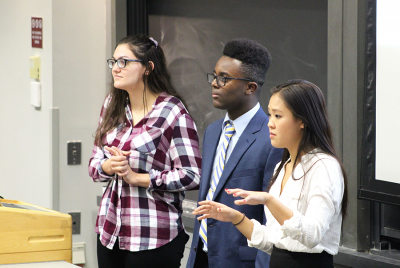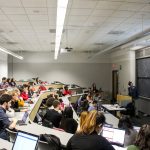
Boston University’s Student Government met Monday night to confirm four judicial commissioners and hear a bylaw amendment proposal from the Senate Outreach Program.
SG Senate Chair Andrew Chiao began the meeting by introducing the E-board’s new SG website. The site allows its visitors to access meeting minutes, senator voting records and information on upcoming events.
SG President Devin Harvin then gave his weekly address to the senate to plug upcoming events for the student body. Harvin reminded senators that the E-board is trying to get people involved in the spring concert and mentioned an upcoming T-shirt design contest for the men’s basketball team.
He closed the speech by asking senators to spread the word about a karaoke night that SG will be hosting in their office Wednesday night.
“Come on out if you can sing, or even if you can’t,” Harvin said.
Christian Vanleer, a sophomore in the College of Arts and Sciences, and Questrom School of Business students Aaron Torres (freshman), Derrick Lottie Jr. (sophomore) and Bridget Bishop (sophomore) were all confirmed as judicial commissioners of the senate.
According to the SG constitution, judicial commissioners are responsible for advising the E-board on proposed amendments, bylaws and resolutions and providing neutral oversight of the Student Election Commission.
Vanleer said he wanted to take on the position because of his belief in the work of the senate.
“I believe in the power of representation,” Vanleer said. “I believe all of you do good work, and I want to be a part of that. I will continue to build the connections that you all are building with the student body.”
Bishop spoke extensively on the necessity of collaboration among all of the commissioners.
“Making any decision and following through on it is very important,” Bishop said. “With the four judicial commissioners, we plan to work together and collaborate.”
When the floor opened up to questioning, Nehemiah Dureus, SG director of communications, said judicial commissioners are the “gatekeepers” of SG.
“The job you guys have really does [have] impact and means a lot to me and the senate and many students across campus,” Dureus said. “I just want you guys to know that what you guys do and will do is very important.”
Questrom freshman Gurpinder Singh said he is supportive of the commissioners confirmed.
“I felt confident in all of the [judicial commissioners] and their abilities and what they said they were going to do,” Singh said.
Other senators, however, were less thrilled with the system used to vet and confirm the commissioners. Aditya Jain, a sophomore in the College of Engineering, said he was “unhappy” with the rushed nature of the process.
“Some of the senators had compiled a list of questions they had wanted answered by the judicial commissioners before the meeting,” Jain said. “We had emailed these beforehand and we had been told these would be forwarded on to the judicial commissioners, but we got no contact back from them.”
Despite these shortfalls, Jain said he still feels confident in the judicial commissioners’ ability to do their job this semester.
“The reason those questions weren’t asked in this discussion is because they were very in-depth constitutional questions,” Jain explained. “We thought it would be unfair to ask the person on the spot about very specific details about the constitution.”
The Senate Outreach Program presented their proposal to the senate to amend a bylaw for article three, section one, line nine of the senate bylaws. The bylaw would improve accountability of SG as a mechanism for change and student representation, especially in recruiting student organizations to participate in the spring concert.
The proposal aimed to add the line “senators shall engage the student body whenever possible, specifically establishing and maintaining relations with two student organizations each term, 4 throughout the year of their time in student government.”
Chiao said that there was some “contention” surrounding the proposal, as discussion of the proposal lasted well over its originally allotted 17 minutes. The biggest issue senators seemed to have with it was the timeline, Chiao said, as senators would only have two weeks to secure support from student organizations for the spring concert, rather than three.
CAS senior Katherine Kahley called the proposal exciting and said she was happy to see enthusiasm from the senators.
“I think that outreach is really important and something Student Government has always historically struggled with,” Kahley said, “and so as being involved with outreach on the communication side of student government, I’m really glad to see that we might be putting it into our bylaws and making it more official.”
Vice President of Internal Affairs Lovie Burleson agreed and said she thought the proposal was a great start.
“In the past, we didn’t really have as much recognition on campus, and I thought that it was a great effort by our senators as a first proposal,” Burleson said. “I especially thought that it was great that they asked for suggestions instead of saying, ‘This is what we’re going to do.’”
The rules of the senate constitution require bylaws to be tabled for a week after initial proposal, so no vote was conducted Monday night.
Audrey Martin contributed reporting.
CORRECTION: The photo caption in a previous version of this article misspelled Mwaura’s name. An updated version of this article reflects this correction.














